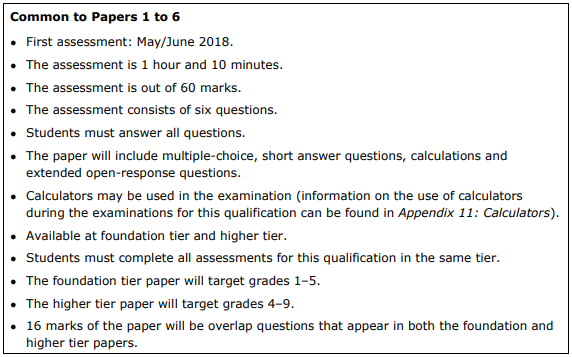Mock test. 1 hour and 10 minutes. 60 marks available.
Edexcel Combined Science Paper 2: Biology 2
Good Luck!
Is this higher or foundation?
This is a combined paper for higher and foundation students. You can achieve grades 1 – 9 on this paper, so it is suitable for all. Grades are moderated against the average result to give the most accurate indication of your performance. You can look at – How is this paper marked? for more information.
How is this paper marked?
This paper is automatically marked to determine which questions were answered correctly.
Your grade is determined using a Z-Score moderation system. Your GCSE exams are also moderated comparably so that the difficulty of papers is taken into account.
Roughly, this works by calculating your overall percentage and comparing it to the average percentage and the standard deviation. This means that for harder papers you need fewer points to get the same grade as you would for an easier paper.
As more students attempt the paper, the average score and standard deviation more accurately represent the difficulty of the paper and the grades become more accurate.
Making these papers and the marking system took considerable effort so if you found them helpful for your revision, please show your appreciation by rating the page.
What does Edexcel Combined Science Paper 2: Biology 2 cover - in more detail?
Similar to paper 1, the exam covers the foundational knowledge of cells, enzymes and basic material transportation methods such as diffusion and osmosis. This ensures that students have an appropriate background before moving on to later biology topics. Microscopy for example is required to understand how we have determined details about how plant structures work and function. How does photosynthesis happen? This is a question we could not answer without the tools of microscopy and also the basics of chemistry. The overlap between disciplines is self-evident when you consider the background you need to know before understanding concepts like photosynthesis and respiration.
The paper in CB6 tests students’ knowledge of the principles which underpin food chains, namely photosynthesis and the transportation processes which facilitate it. In CB7 – Animal coordination, control and homeostasis; hormones and metabolic processes, alongside the menstrual cycle are addressed. Additionally, control of blood glucose and diabetes are introduced. CB8 includes transport and exchange systems in animals and plants which involves an understanding of the circulatory system, how the heart works and cellular respiration. Finally, in CB9, ecosystems are covered and related topics of ecology. These include biotic and abiotic factors, parasitism, mutualism and biodiversity. Material cycles are the last topics to appear in CB9.
Have you finished studying for paper 1? If not you should go back and try our mock test – Edexcel Combined Science Paper 1: Biology 1.


